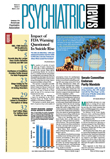Hot-dog eating contests and marathon wing-eating sessions are as American as apple pie. There is even a competitive-eating federation that exists to separate the weaklings from the true Champions of Chow.
Does engaging in such public acts of gluttony qualify contestants as having binge eating disorder?
Probably not, say experts.
People with binge eating disorder consume large amounts of food at least twice weekly and experience a sense of loss of control over their eating, according to James Hudson, M.D., Sc.D., who is first author of a study finding that 2 percent of men and 3.5 percent of women are either experiencing or have experienced symptoms of the disorder.
Bingers usually eat until they are uncomfortably full, but it is not hunger that drives the behavior. In fact, binges often start when people are not hungry, Hudson and others noted on a conference call in February to announce the study findings. After binge eating, people often feel distressed or guilty about the episode, they noted.
“Many patients with binge eating disorder tell us that after dinner, at about 9 p.m., they enter the kitchen intending to eat a few potato chips,” said Harrison Pope Jr., M.D., M.P.H., a study coauthors and a professor of psychiatry at Harvard Medical School. “But they don't stop with a few chips. After eating something salty, they want something sweet,” and end up eating much more than they intended to, he noted.
“These people experience a true loss of control,” he said.“ Once they step off the cliff,” there's no turning back.
Eating disorder expert Cynthia Bulik, Ph.D., who also participated in the call, related an anecdote from clinical experience: One of her patients with BED would order from the “drive-thru” windows of fast-food restaurants and binge while driving, she said.
Bulik worked on an “elaborate” plan to help her patient choose healthier foods. When it came time to implement the plan, the patient found that the restaurant she had chosen had added warm cinnamon buns to the menu and ended up ordering six. “She could not inhibit the urge,” noted Bulik. “All the planning in the world can be undone by a sudden cue from the environment.”
Bulik is the William and Jeanne Jordan Distinguished Professor of Eating Disorders at the University of North Carolina at Chapel Hill and director of the eating disorders program there.
The three experts agreed that binge eating disorder has both a genetic and environmental component. For those who are genetically vulnerable to binge eating, “walking through a food court at a mall is like walking through a minefield,” noted Bulik, whereas those who are not genetically predisposed can resist the temptation of a “cultural barrage.”
Hudson noted that binge eating behavior is modifiable and can be reduced through cognitive-behavioral therapy and/or medications such as the anticonvulsant topiramate or the appetite suppressant sibutramine hydrochloride monohydrate.
In cases in which binge eating disorder results in severe obesity, gastric banding or gastric bypass surgery is sometimes used.
“Further study into the genetic components underlying binge eating disorder may help us to prevent and treat many cases of obesity,” Hudson noted.
